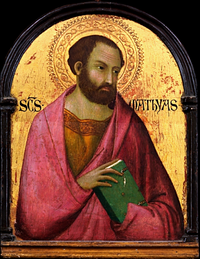History is a unique and maddening field. In most any other field of study, digging deeper and deeper reveals refinements of the lessons which one has previously learned. History, though is like an onion, with each layer being distinct, unique and different from those above and below it. What you learned in grade school has to be relearned at college....and then again in grad school. I point this out because much of what catholics consider 'religion' is either directly or indirectly tied into history and, bluntly put, what you were told before is probably not true at all and, it most certainly isn't exactly true.
Today is the feast of St. Matthias, who was chosen by lots to be an apostle by the other apostles in the book of Acts. His method of appointment was commented upon by St. Clement of Alexandria:
Not that they became apostles through being chosen for some distinguished peculiarity of nature, since also Judas was chosen along with them. But they were capable of becoming apostles on being chosen by Him who foresees even ultimate issues. Matthias, accordingly, who was not chosen along with them, on showing himself worthy of becoming an apostle, is substituted for Judas.
I find this of substantive interest, as it posits the notion that there are no specific requirements or bars to being even an apostle, if God wills it.When we look at those who the original apostles, the most 'in' of the 'in-crowd' of Christ, none of those who partook of the first Eucharist were baptized. If you wish to cast your net wider when talking of apostles, you have one rabbi (Paul), a woman (Mary Magdalene) and, of course, Matthias.
In the Pauline era, a saint was someone, alive or dead, whose virtuous words and deeds inspired and encouraged others. There wasn't a checklist and number of miracles required...nor a panel or body which decided their holiness.
Then again, this was the era in which clergy were to required to be married (to only one wife) with children, women were permitted to be deacons and the people, not the prelates, decided who was suitable to be a leader. It was the era when being a Christian meant following two rules, not thousands of canons.
How times change.

Ouch! The truth in the last paragraph hurts. One of the things that challenges me big time is the utter humility of God. The only One who CAN control every iota continually chooses not to do so. Why, oh why, can't we embrace His example?
ReplyDeleteThe real trick is that we CAN embrace that example, Chris. It is by our own Free Will (individually and collectively) that we choose not to.
ReplyDelete